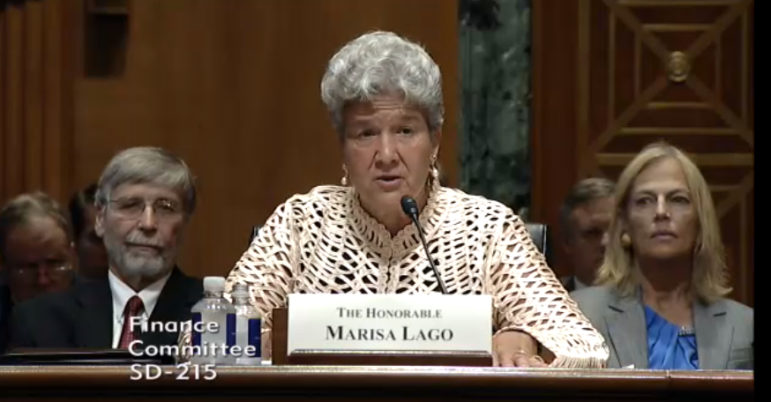
U.S. Senate
Marisa Lago, then an assistant secretary of the treasury, appearing before the U.S. Senate Finance Committee in 2015 as President Obama's nominee to be Deputy U.S. Trade Representative. The nomination was held up in a dispute over the Trans-Pacific Partnership.
The woman whom Mayor be Blasio has picked to be his new planning chief is proud of the fact that she’s had the unique, if not singular, honor of working for the first black mayor of New York City, the first black governor of New York State and the first black president of the United States. Over a 30-year career in public service, she has had a hand in initiatives running the gamut from a stellar new convention center in Boston to World Bank projects in the developing world to the building of Brooklyn Bridge Park. A child of immigrants with Brooklyn roots who quotes Spanish poetry without putting on airs, Marisa Lago speaks with a gentle voice but is described in the press as “formidable”—in a good way.
“Marisa comes to our administration with unmatched experience building neighborhoods and planning for the future,” de Blasio said when announcing her appointment last month to replace the outgoing Carl Weisbrod. Citing Lago’s “record of bringing communities together,” the mayor added. “We look forward to her taking up the reins as we build more affordable homes and foster the good jobs New Yorkers need.”
City Hall’s announcement noted that Lago “has also worked in the private sector with Citigroup.”
From April 2003 to August 2008, Lago was the global chief of compliance for Citi Global Markets Inc. of CGMI, the investment arm of Citigroup. In the years since Lago’s departure from Citigroup, CGMI has been targeted by a number of enforcement proceedings for serious failings, some of which cited the bank’s compliance functions.
Yet, according to Lago, even as she sought and attained high-ranking jobs in Albany, Washington and now New York City government, no one has ever asked her about her role at CGMI.
‘Part of the solution’
Lago went to Citigroup in 2001 after a stint at the Securities and Exchange Commission, working first as Citi’s director of global workforce development before being elevated to the compliance post, a newly created position. When she took the compliance job, Time magazine said it was “to help fix the reputation” of CGMI, which was known as Salomon Smith Barney before Citi subsumed it.
At the time Lago was hired, Citi had recently agreed to pay $400 million to settle accusations that CGMI “misled investors by touting stocks of its investment-banking clients,” according to a story reporting the hire in Time magazine. Time saw Lago’s arrival as an effort to clean up Citi’s act because “Lago, who was once head of international affairs at the Securities and Exchange Commission, knows a thing or two about enforcement.” American Banker reported at the time that Lago would be responsible for “coordinating and overseeing all compliance matters for the corporate and institutional businesses globally.”
Lago later told a U.S. Senate Committee considering her nomination to be the deputy U.S. trade representative that in her compliance post she “was responsible for compliance matters for Citigroup’s Markets and Banking businesses including: investment and corporate banking; sales and trading of equities, fixed income, currencies and commodities; public finance; and transaction services.” She oversaw 500 employees and a budget of more than $100 million, was a member of Citi’s Management Committee and part of its Corporate and Investment Banking Planning Group and held two securities licenses.
Lago left Citigroup in June of 2008. In a memo to staff, Citi’s vice chairman, Lewis Kaden, thanked Lago “for her many substantial contributions to Citi, particularly for her successes in building an effective, global compliance program for the Markets, Banking & GTS businesses.”
The financial crisis broke into the open a few months later with the collapse of Bear Stearns and Lehman Brothers. Citigroup and just about every other major financial player was ultimately caught up in the spiraling emergency. When it was over, Citigroup figured prominently in attempts by scholars and regulators to figure out what had gone wrong and punish offenders.
The Securities and Exchange Commission announced in 2010 a $75 million settlement with Citigroup and alleged that “Citigroup repeatedly made misleading statements in earnings calls and public filings about the extent of its holdings of assets backed by subprime mortgages,” representing its exposure to sub-prime mortgage as one third as large as it really was.
The following year, the SEC said that Citigroup had agreed to pay $285 million to settle charges that Citigroup Global Markets Inc. had in 2007 mislead investors about collateralized debt obligations, the financial instruments that played a leading role in triggering the crisis. According to the SEC, Citi never told investors that it had taken a short position—in other words, betting that the price of a security would fall—in the investment products it was selling. The SEC’s statement of facts in the case alleged that CGMI “negligently misrepresented key deal terms” to investors.
In July 2014, the U.S. Department of Justice announced it reached a record-breaking $7 billion dollar settlement agreement with Citigroup for misleading investors about the quality of their securities, which were in fact backed by “toxic mortgages.” Citigroup Global Markets Inc. was at the center of those problems. In a press release announcing the settlement, the DOJ said, “Citigroup acknowledged it made serious misrepresentations to the public – including the investing public – about the mortgage loans it securitized.” It continued: “Contrary to those representations, Citigroup securitized and sold [mortgage-backed securities] with underlying mortgage loans that it knew had material defects.”
In 2015, Citigroup was hit with two penalties from the SEC. The first was a $15 million slap because “Citigroup Global Markets … failed to enforce policies and procedures to prevent and detect securities transactions that could involve the misuse of material, nonpublic information” over the period of 2002 to 2012. That SEC investigation found that Citigroup did not review thousands of trades executed by several of its trading desks during a 10-year period. “Citigroup’s policies and procedures to avoid such occurrences were not reasonably designed or implemented and failed to divert certain advisory orders away from this affiliate,” the SEC asserted.
Also in 2015, SEC settled with Citigroup for $180 million for conduct involving CGMI and another division that had, from 2002 to 2007 allegedly made “material misstatements and omissions … in the offer and sale of securities in two now-defunct hedge funds.”
Very few individuals were singled out for blame in those post-mortems. A few figures at Citigroup were targeted as personally culpable, but neither Lago nor her office were among them.
In a phone interview last week, City Limits asked Lago if she felt any responsibility for the multitude of problems at Citi during her tenure. She said she did not. “There was before the current global financial crisis, if one sort of dialed back to the late nineties and early aughts, a recognition that there were practices on Wall Street—a failure to abide by regulatory requirements, or loose practices around it. And so I was brought in as part of the solution to some of the concerns, the scandals of the day, and so was very much focused on, one, markedly increasing the compliance function; second, increasingly focusing it on the needs of regulators worldwide” because Citi’s focus on domestic regulators was out of step with its global footprint.”
“I view myself as part of the solution of enhancing controls.” Lago says. “The financial crisis, when people look at the failures there, they very much function on the risk function and the risk appetite that the firms had—the willingness to take on increased risk. The risk function and the compliance function are separate functions. The compliance function doesn’t say ‘This is how much risk you should take.’ The risk function sets the risk appetite. Compliance focuses on regardless of what products you’re offering , what do you have, are you offering them in accordance with the legal requirements. Do you have in place the proper controls against them?”
“The people who own the responsibility are the front-line business people. Those of us in the compliance function, and I was part of this, were there to build a compliance function,” Lago says. “Was compliance perfect? No. Was I any part of the [Department of Justice] investigation or any of the aftermath? No.”
In its 2011 report, the Financial Crisis Inquiry Commission indicates that during Lago’s tenure, Citigroup resolved regulators concerns from earlier crises. The company’s rating from the Federal Reserve was raised from “fair” to “satisfactory” in 2006 and around the same time a March 2005 ban on buying new business lines was lifted. The problem is that after regulators eased up “the previous focus on risk and compliance gave way to business expansion and profits.” There is evidence in the final report of the official Financial Crisis Inquiry Commission that there were dissents within Citi about some of the firm’s disastrous practices, but it’s unclear whether those warnings came from the compliance office. The commission put blame on regulators who failed to keep adequate tabs on what Citigroup was doing, but there clearly were problems at the firm itself, as well. “In May and June 2008, Citigroup entered into memoranda of understanding with both the New York Fed and OCC to resolve the risk management weaknesses that the events of 2007 had laid bare,” the commission’s final report read.
The role of compliance officers has been evolving as Wall Street moved from the Enron-era crises through the subprime mortgage mess and into the somewhat stricter regulations that exist today. But it is still a murky role. At any point in time, at any particular institution, the exact role of the compliance officer would depend on the management structure and leadership culture in place there at the moment.
“A compliance officer—especially a chief compliance officer—is there to ensure that the firm complies with the law law and regulations and even just best practices,” says James Fanto, a professor at Brooklyn Law School who has studied the compliance function, speaking about the field in general and not specifically about how compliance was done at Citigroup. “[A compliance officer’s] responsibility is to tell the people how to do their business in line with the law and then to check up on them that indeed they’re complying with the law.” Fanto adds: “I think it’s a fair question to ask someone in charge of compliance at a major financial institution that then got into a lot of trouble, ‘What were you doing?'”
Fanto notes, however, that compliance officers ultimately are not responsible for the firm and its employees following the law. “They can be overridden by the business people and people higher up in the chain,” he says. “You could have someone who’s really good .. and they were overridden by senior executives.” Compliance officers do, however, play an important role in reporting to regulators, investors and the public on what a financial institution is doing.
Lago says that she was never asked during the vetting process for her subsequent jobs—as Gov. David Paterson’s head of economic development, as an assistant secretary for the treasury with top-secret security clearance in the Obama administration, as President Obama’s nominee to be deputy U.S. Trade Representative, and now as de Blasio’s incoming Chair of the Planning Commission—anything about what if any role she had in the problems that occurred at Citi.
Battles and progress in Boston
Lago’s name does not appear to have been well known to many people involved in planning and zoning discussions. “She sounds like a nice person,” said one housing advocate. “That’s all I know.” Anna Hayes Levin, a member of the Planning Commission, said Lago’s new role, “was news to me as much as anyone else; I had not heard her name around state or city government.”
Asked whether Lago’s tenure at Citigroup was cause for concern, Michelle de la Uz, executive director of the Fifth Avenue Committee and a member of the Planning Commission, said: “I think the answer is maybe. At the same time, she’s served in the Obama administration. She was involved in the Dinkins administration. Those are leaders who focus on equality and accountability that would counter-balance those concerns. I think she’s qualified, for sure. That’s not in question.”
Whatever Lago’s role was at Citigroup, it was but one stop in a long career that began in and now will return to New York City. Born in Brooklyn in 1955, Lago graduated from Cooper Union with a physics degree in 1977 and earned her J.D. at Harvard Law in 1982. After a year-long stint clerking for a federal judge, Lago was special assistant to the chairman of the New York City Planning Commission for two years. Shifting to the private sector, she spent four and a half years at a Boston law firm, rising to junior partner. Lago came back to New York shortly after Dinkins became mayor in 1990 as the senior vice president for legal affairs and general counsel at what’s now called the Economic Development Corporation. She stayed there until the early months of the Rudy Giuliani era.
Given the dynamics changes in New York’s recent history, early 1994 was quite some time ago. She sees constants: “The diversity of the city. The vitality of its economy. The vitality and diversity of its neighborhoods. The fact that it’s a city of immigrants. It’s a complex city. One can’t speak with a broad brush of the city as a whole let alone of any borough.” But while Lago says she views her appointment by de Blasio as a “homecoming,” she also acknowledges that it’s a different place to which she’s returning. “The city is much more prosperous today that it was in 1983 or during the Dinkins years but with the success of a larger population, a lower crime rate, of more employment, that also brings with it issues like inequality that we might have kidded ourselves were issues of the developing world but those issues are front and center,” she says. “I’m proud to join the de Blasio administration for taking these issues seriously. A city has to work for all of its residents or it loses it vitality, the diversity that makes makes it the New York that we love.”
From the EDC Lago moved in 1994 to the Bay State to take over the Boston Redevelopment Authority or BRA, which combines economic development and city planning functions and also oversaw public housing and neighborhood development. Arriving during Thomas Menino’s first term as mayor, Lago had a high-profile role in many projects, but none attracted as much attention as the “megaplex”—the idea of combining a new convention center with facilities for the Patriots and Red Sox. The incredibly contentious debate over whether and where to build the center played out for years, involving beloved sports franchises, a Democratic mayor, Republican governor and communities that didn’t welcome the prospect of a massive new neighbor. In the end, Fenway was refurbished, the Patriots built a new stadium next to their old one and Boston built a standalone convention center. The teams have claimed eight world championships since.
Press accounts suggested Lago had a tense relationship with Marino and was isolated by the end of her tenure. Asked about this, she says: “Mayor Menino brought me in as someone who knew her stuff, who was accomplished in New York City. I was not part of his political long march,” from City Councilor to president of the City Council to what became five years as mayor. “I believe I was told by my team that I was one of the longest serving directors of the BRA. High profile position. The mayor and I accomplished a lot” including the convention center, an Enterprise Zone for Roxbury and two HOPE VI grants to demolish and replace troubled public housing developments.
One of Lago’s jobs at the BRA was to oversee an affordable-housing development project in Boston’s West End, an area that had been obliterated by urban renewal decades earlier. The project became mired in a dispute over who would get to live in the new housing units. Massachusetts law required that people displaced by the earlier use of eminent domain—who were overwhelmingly white—get first dibs. But policies attached to federal funding for the project mandated that efforts be made to give preference to black and brown people. A tenant selection plan was structured to try to satisfy both goals. Some former West Enders thought it fell short and sued, but lost.
Lago recalls one episode in the West End early in her tenure. “At a public hearing a grown man was talking about the land being ripped from his family. He was passionate. He was articulate. He was emotional about it and I remember being confused because I didn’t recall any recent condemnation. He was talking about something that had happened decades before.” It was an indicator, Lago says, of “the power of the sense of lost community, the powerful sentiment that old style urban renewal—back then it was called ‘slum clearance’—[generated] and that it persisted.”
Lago says she can relate to that sentiment. As a child she remembers, “We would never drive onto the Atlantic Avenue ramp on the BQE without my father recalling that Emmett Street used to be there and that was where he lived at the time and that it had been taken. So we have a particular hostility to the Atlantic Avenue on-ramp to the BQE.”
The lesson she takes, from the West End guy and her dad, “is that one has to recognize communities aren’t monolithic. There are many voices within a community. Zoning is complex. It affects people where they live. So it is essential to listen to the many voices in the community.”
A four-and-a-half-year stint as director of the SEC’s Office of International Affairs followed. Lago has written that at the commission “I played a key role in numerous international initiatives involving: trade in financial services; international accounting standards; regulation of financial conglomerates; corporate governance; securities activities on the Internet; and enhancing financial regulation in off-shore financial centers. I also represented the SEC with the securities and banking regulators in both developed and emerging markets.” Then came the seven-year stint at Citigroup.
Obama’s nod ends short stint in Albany
In August 2008, Gov. David Paterson named her president and CEO of the Empire State Development Corporation. In her brief time as ESDC she worked on Erie Canal Harbor in Buffalo, the expansion and renovation of the Jacob Javits Convention Center in Manhattan, and Brooklyn Bridge Park. Regina Myer, who was president of the Brooklyn Bridge Park Corporate at the time, recalls Lago as making the decision to proceed with developing two piers to form the anchors for the emerging park. “I thought it was a bold move to move ahead with the park,” Myer, now the head of Downtown Brooklyn Partnership, recalls, “because of the uncertainty, with changes in the economy, at the time.” Once the decision to move forward was made, Myer says, Lago was “incredibly rigorous in terms of our contracts. She really put me though the right paces—not just following the procurement rules, but really negotiating hard.”
There were press reports of turmoil between Lago and other Paterson administration development officials, but Lago says she left ESDC in late 2009 only because the gig in the Obama administration opened up. In Obama’s Treasury Department, Lago served as Assistant Secretary for International Markets and Development, where she had a lead role in encouraging foreign investment in the U.S. and discussions over international regulation of financial services. She also directed the administration’s role on international development assistance via entities like the World Bank.
In late 2014, Obama nominated Lago to be the Deputy United States Trade Representative, with the rank of ambassador. The post required Senate confirmation, and while the Senate Finance Committee approved Lago, Sen. Sherrod Brown placed a hold on the final vote because of a dispute over access to documents explaining provisions of the Trans-Pacific Partnership or TPP. The hold was never lifted.
Lago has in the past spoken positively about the TPP, a trade deal that de Blasio opposed and that President Trump has now moved to scuttle. The opposition to TPP grew out of frustration with earlier trade agreements, like NAFTA. Given its connections to overseas markets, New York City hasn’t been exempted from NAFTA’s impact: Some blame that deal for the shrinkage of the city’s textile industry in the late 1990s.
Asked if free trade agreements benefit the city, Lago says that Obama has tried to create trade agreements that took more account of labor rights and environmental considerations. “That said, the challenge is trade agreements and the impacts are not felt similarly across all swaths of the economy so the importance is on focusing on making sure that we have an economies that works across the spectrum.”
“The question is, how do we as a society address those who are bearing the adverse impacts?” she continues. “We can’t just look at it as saying it is just one tool. One needs to invest in worker re-education.”
An unexpected homecoming
Lago expected to continue serving in Washington. The 2016 presidential election upended those plans. Instead of working for the first woman president, she was among the select crowd invited to bid Obama farewell at Joint Base Andrews. Now she joins de Blasio’s administration at a critical time, as the mayor faces re-election and the public review begins for some of the rezoning proposals that will occupy an important place in de Blasio’s housing plan and physical legacy.
She brings to that post her father’s attachment to a lost street, the sense of deep history she witnessed in Boston’s West End, and the conversations she had while visiting 43 countries on behalf of the Treasury Department in her role as the representative to the World Bank and the regional development banks.
On those visits, Lago says, she learned to listen. “When one meets with communities doing international development, it is almost always the women. They are the farmers. They are the bedrock of the community,” Lago recalls. “They know their community. They may not speak a language of planning. They may not speak a language of development. They may not speak a language of legal documents and loan documents and financing mechanisms. But they know what their needs are and they understand the way their communities work.”
It’s hard to argue that insight is not an asset for the mayor’s new planning chief. Lago also sees her time at Citigroup as a plus. “The value I bring is that I speak government but I also speak business,” she says, “and that is a positive.”








